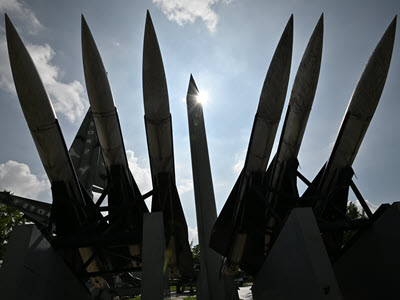The Unacceptable Costs of ROK Nuclearization and the Need for Congressional Action
Mark Fitzpatrick argues that the Republic of Korea should weigh the supposed benefits of going nuclear against the economic, political, and security costs of breaking out of the Nuclear Non-Proliferation Treaty. This commentary is part of the roundtable Nuclear Armament Discourse in the Republic of Korea.
For over half a century, U.S. presidents from both parties have upheld a universal policy of nuclear nonproliferation, applied to friend and foe alike. Nonproliferation is a global good, for which Washington has been the main architect and protector. It also is in U.S. national interests, not least because it helps protect the United States against entanglement in nuclear conflicts. Thanks to U.S. leadership, the nuclear club has been kept to single digits.
In 1975 the Nixon administration forced the Republic of Korea (ROK) to end its secret pursuit of nuclear weapons technology, warning President Park Chung-hee that this pursuit put the alliance at risk. Later that decade and the next, the United States repeatedly forced Taiwan under President Chiang Kai-shek to end the development of nuclear weapons. Throughout the Cold War, whenever Japanese leaders hinted about considering nuclear weapons, U.S. counterparts reinforced security assurances to persuade Japan to remain a non-nuclear state.
The universal nonproliferation policy was also successfully applied to curb nuclear aspirations in Argentina, Brazil, Iran, Iraq, and Libya. It was unsuccessful, however, regarding India, Pakistan, and North Korea, though not for lack of trying. Israel has been the lone exception to U.S. nonproliferation policy. President John Kennedy tried to halt the Dimona project, which was based on French technology, but President Richard Nixon agreed with Prime Minister Golda Meir to look the other way as long as Israel did not publicly acknowledge its nuclear program.
Today, a number of South Koreans are knocking on the nuclear door—for understandable reasons. Across the 38th parallel, the ROK faces a hostile enemy building up nuclear and missile arsenals without letup. Across the Yellow Sea, China, while not as directly threatening, is also increasing its nuclear arsenal.
President Yoon Suk-yeol quickly backed away from his January 11 comment that his country would consider building nuclear weapons of its own or ask the United States to redeploy them on the Korean Peninsula if North Korea’s nuclear threat continued to grow. The impulse remains strong, however. A whopping 70% of South Koreans say in opinion polls that they want a nuclear equalizer. A main motivation is a desire for “agency” in their own national security, especially to negotiate with North Korea on equal footing. Seoul mayor Oh Se-hoon added fuel to the nuclear push in a Reuters interview on March 13.
In mapping its policy, the ROK should weigh the supposed benefits of going nuclear against the economic, political, and security costs of breaking out of the Nuclear Non-Proliferation Treaty (NPT). The United States and other suppliers would be bound by law to stop providing the uranium fuel for the country’s 25 nuclear power plants and the cooperation that enables South Korea to be a major nuclear technology exporter. Laws in the United States, Japan, and Europe would also affect defense sales, loans, and credit guarantees. China could be expected to apply sanctions that are more biting. North Korea might even be tempted to launch preemptive strikes during the vulnerable two years or so that it would take the ROK to realize a nuclear capability. And South Korean nuclearization is the likeliest trigger for Japan to seek its own nuclear weapons.
These would also be serious costs to the United States. With the NPT in tatters, other nations, such as Saudi Arabia and Turkey, would be more inclined to follow the ROK in pursuing nuclear weapons. While a proliferation cascade is not preordained, the risk would heighten. More nuclear-armed states would mean more danger of nuclear use and fewer ways for the United States to exercise control. Additionally, a South Korean decision to go nuclear would be tantamount to an expression of nonconfidence in the U.S. security guarantee, thereby damaging the United States’ standing with allies and adversaries alike. Credibility rests on perceptions, which a ROK nuclear program would seriously undermine.
ROK politicians should not be led to think that the United States would passively accept such a program. While the executive branch may find quiet diplomacy a better avenue to express opposition, legislators can assist by encouraging caution in public. One avenue would be the passage of a congressional resolution. This should be framed in positive terms as a show of support for the long-standing bipartisan policy of nonproliferation as well as for South Korea’s exclusively civil nuclear energy program. The resolution should include a reaffirmation of U.S. security guarantees for allies facing nuclear threats. It need not include as many clauses as the nonproliferation resolution that was introduced in May 2019 but did not advance. If such a resolution lacks congressional support, an easier alternative might be language in the conference report on an appropriations bill.
Individual members of Congress should also speak out, not to excoriate the nuclear impulses in South Korea but to extol the country’s nonproliferation bona fides. The ROK proudly wears the white hat of a committed non-nuclear state. It would be lamentable to see the headgear change to black.
Mark Fitzpatrick is an Associate Fellow at the International Institute for Strategic Studies and a former U.S. deputy assistant secretary of state for nonproliferation (acting). He is author of Asia’s Latent Nuclear Powers: Japan, South Korea and Taiwan (2016).



